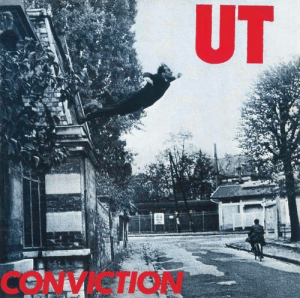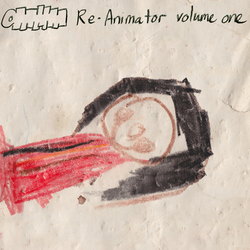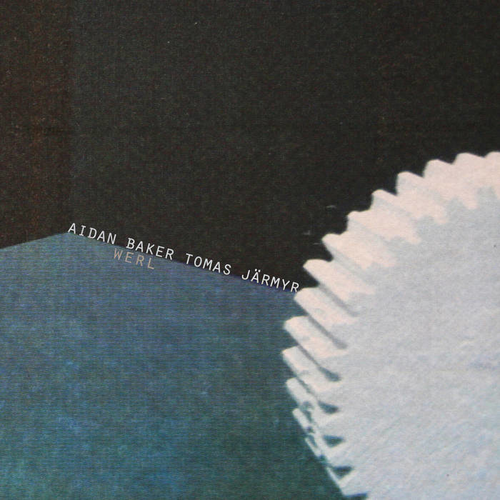 In the next part of Ut‘s re-issue campaign, their first album Conviction is up for the treatment and deservedly so. As mentioned before, for me they were unsung heroes and the purity of their democracy was something that a lot of other bands could have learned from. The fact that Nina Canal, Sally Young and Jacqi Ham all wrote and all sang is an unusual thing in itself, but the diversity in songwriting styles that the three showed is what made their union magical.
In the next part of Ut‘s re-issue campaign, their first album Conviction is up for the treatment and deservedly so. As mentioned before, for me they were unsung heroes and the purity of their democracy was something that a lot of other bands could have learned from. The fact that Nina Canal, Sally Young and Jacqi Ham all wrote and all sang is an unusual thing in itself, but the diversity in songwriting styles that the three showed is what made their union magical.
Ut were three very different characters who all pulled in the same direction, aiming for a particular sound that was a distillation of the music growing up around them and their shared vision. The album was originally released on their own Out Records label and it was what brought them to the attention of Paul Smith‘s Blast First, but considering how long the band had been together (since 1978), it was a long time to wait until 1985. Although they had released a live cassette in 1982, this would be the first chance to hear a full studio recording of their take on the kind of radical post-punk, no wave guitar mash-up that was coming out of New York at the time.
The questing nature of the band and their ever-evolving sound means that none of the tracks from the live cassette appear on Conviction. They had refined their sound a little, but there were still harsh edges and dissonance that set them apart from a lot of what was happening in 1985. When the album opens it is exactly what you want to hear; the tribal energy of the drums on “Confidential” joins forces with piledriving bass to propel the song. The choppy detuned guitar and Sally’s she-wolf vocals surf a tide as Nina sounds as though she is trying to beat her way out of a locked room, and some of the fills are a delight. You couldn’t ask for a more different track to follow this. Nina’s “Sick” has a bemused and distant sound, with the vocals sliding in and out of the mix at will. It is choppy and messy and unable to settle, as if each member of the band is trying to derail the song before it has a chance to gain momentum, and the picked guitar solo towards the end is harsh and slightly demented. And so it goes, jumping from one singer to the next, unwilling or unable to settle on a particular sound or style. Sally’s “Phoenix” is so like a Throwing Muses track that it can’t be coincidence that their first LP came out a year later. Jacqui’s “Absent Farmer” appears like a stream of consciousness ode to the perils of farming in the wilds of the American plains, but I will let you read what you like into the impressionistic lyrics that spill over the top of the song, half sneer, half shriek. The album was recorded with Henry Cow‘s Tim Hodgkinson at Cold Storage in London and his bleary saxophone lends a snowy London texture to the slow build of “Stain”. Jacqui’s imagery is vivid, yet it leaves room for your own interpretation and her vocal line does a kind of duet with the saxophone as the rhythm section tracks it subtly, keeping an eye but doing its own thing.You could chew the bass on Nina’s “Prehistory”, it is so thick, while the guitar takes the opposite route, all sharp and spindly. It feels as though everyone is trying something different with a cut and paste of sounds that shouldn’t work, but does. There is a strength and a kind of bravery to this style of song construction that draws you further in, and Jacqui’s way of playing with words and her structure of sentences is endlessly fascinating, allowing the story based songs to unfold like a narrative. It all changes for the last track, “Mouse Sleep”. With its detuned guitars and tumbling drums, there is a free-for-all of scattered textures and blurred vocals, the dissonant guitars fraying like nerves as the bass sets off like a depth charge, the drums falling and laughing all over the place. It is a fine and anarchic end to an incredibly strong first album that still stands up today.
Although the album would normally have ended there, this reissue has the two tracks that were recorded were for Charles Ball‘s Lust/Unlust Music in 1980. Unfortunately, Lust/Unlust went bust and Charles disappeared, leaving these two tracks on the shelf. Back in 1980, Ut were still a four-piece, with Karen Achenbach on second guitar. The harsh, stabbing vignette of “Ampheta Speak” owes a little something to Teenage Jesus with the extra guitar adding a little more hysteria to the fast-paced verbal assault, but as they would continue to do throughout their career, the b-side “While I Wait” is completely different, a monotonous drone of sound with an relentlessly flat vocal laid over the top, like a layer of something stifling and humid. It is an interesting snapshot of the band at the time, but a far cry from the satisfying sound they captured on Conviction.-Mr Olivetti-



